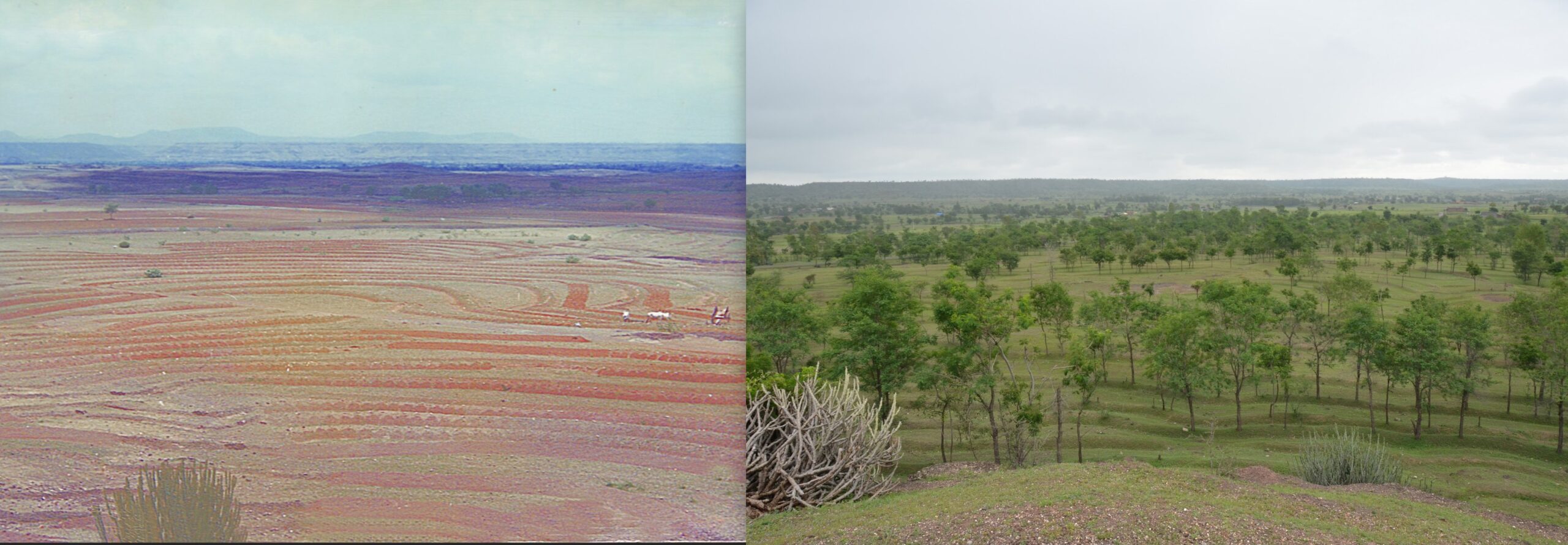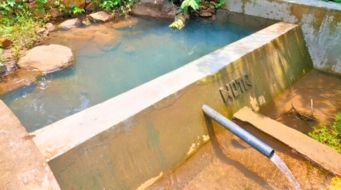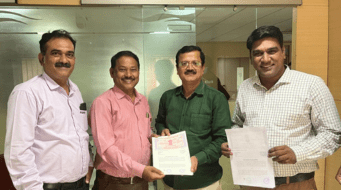
By Aditi Wagh with inputs from the WOTR team
It’s 17th June. It is the World Day to combat desertification and drought.
For 22 years now, WOTR has contributed to fight land degradation and water scarcity in the wake of climate change. Each day we strive to treat and heal the land through Ecosystem Based Watershed Development, Natural Resource Management and Climate smart agriculture in the dry lands of rural India.
As professionals in the development space, we must consciously reflect on our actions and introspect whether we practice what we preach in the name of sustainable development. With this in mind and as a part of an organisation that fights desertification and drought, we decided to have a discussion on what each of us understands by desertification, how we perceive WOTR’s work in this regard and most importantly, what can be done individually as well as unitedly to fight the concerned issue.
Through this post we bring to you excerpts of a stimulating discussion that yielded stimulating results.
WOTRian 1: “World Day to Combat Desertification and Drought is nearing.”
WOTRian 2: “We need to put up something on social media, a success story, another poem, or a message from WOTR… Any ideas?”
WOTRian 1: “Well… we usually talk to the villagers or others about what needs to be done to save water, rebuild their ecosystem and conserve environment, but we haven’t really spoken about this amongst ourselves…”
It was in such candidness that the idea of this discussion emerged…
The very next day, 30 WOTRians gathered in the training hall; seated across tables placed in ‘U’, we began our informal discussion.
To ensure everyone is on the same page, the dialogue began with a basic understanding of what does the term desertification encompass. The group had participants from various departments such as knowledge management (subject area experts in hydrogeology, economics, agriculture, environment science, climate change), GIS, I.T., business development, communications, project management and administration.
Excerpts from the discussion:
“Desertification is a process by which cultivable land is converted to infertile land”
“When the land becomes drier and drier due to increasing salinity…”
“It occurs because of extreme weather changes, drought, deforestation, over grazing, urbanization, and other human activities.”
“Basically, it is a natural phenomenon, however the desertification process has been accelerated due to human intervention, climate change. As this is happening at an unprecedented rate, more and more living organisms are failing to cope up with it.”
“Well, we are talking about the two most important resources necessary for any form of positive development- land and water. Degraded lands, soil erosion, water runoff and deforestation have been identified as the major causes of poverty, low human index and a fractured economy.”
“…also it can also be linked with over exploitation of resources.”
“As desertification triggers biophysical changes, it affects the social and economic aspects of the population. The pressure on livelihoods increases, there are limited resources to meet the increasing demands leading to social conflicts. At the same time food, water and income security of many are threatened, thus affecting a nation’s GDP.”
“I think the need here is to identify the vulnerable areas.”
“…this is where we step in. WOTR tries to identify the vulnerable areas and regulate exploitation of resources”
“Through various soil and water conservation measures, water levels increase and the quality of land improves. As part of watershed development, we also promote and undertake afforestation, averting soil erosion. Rejuvenating the biophysical environment, the pressure put on communities with regards to livelihoods is reduced.”
“Also, our association with MGNREGA plays a very important role in this. This partnership has been a successful approach not just from the perspective of conserving water or overcoming soil erosion but also providing villagers with a regular source of income during drought.”
“Yes, I got similar feedback from the community members during many of my field visits across Jalna this summer. This work has helped them cope up with the harsh conditions while reducing the rate of migration, keeping the family and the community intact.”
“Certainly, but its not just about the work done, it is also the quality and sustainability of the work done. I remember… one of the corporates visiting our village. They were facing problems of their structures breaking so they were unable to achieve water neutrality. But when they saw our structures that had retained for years, they asked for our technical inputs and the quality measures we follow. At the end of the day, the work should help achieve demand and supply side balance of water.”
“In a similar event, one of the journalists who was visiting all villages in the drought hit Marathwada, where work had been done to combat the situation, told our field team that ours was the only village where green patches and water could be seen.”
“But, green patches don’t mean much. Even when we talk about increasing the land under cultivation, that does not necessarily mean we are combatting desertification. In fact, farming of average land which is nutrient deficit is a major cause for desertification. The process of cultivation takes away all nutrients from it.”
“However, in this context our Farmer Field Schools prove helpful to an extent. We inform farmers about soil testing and nutrient management while promoting improved farming techniques.”
“All this is fine, but coming back to sustainability of any development project… In one of the stakeholder engagement sessions consisting participants from 2-3 villages of Bhokardan, I noticed that the interventions in these villages were the same, the process was the same, the problems and the condition of these villages when the project started were more or less the same. But the results were very different. Two of the villages were prospering in drought, while interventions in one village had little impact. I tried to understand why? And found the answer in community participation.”
“Of course, that is the key. Any organisation does any work with any community, engaging the community, identifying leadership and nurturing it is necessary for sustaining that effort…”
“Active participation comes with proper understanding of the consequences of desertification, that it not just decreases the groundwater level and destroys the green cover but triggers a vicious circle that leads to rural and urban poverty, malnutrition, increasing conflicts over resources, negative effects on education and an increasing rift between the rich and the poor.”
“Knowledge transfer is the key here. It is more than telling the rural community members what to do. It is also making the urban population understand what their lifestyle costs.”
“Absolutely, we always transfer our burdens to them. They have to budget water, they have to plant trees, they have to use resources wisely! I think educated people are more ignorant. We all blame one another, if not the government.”
“How in our small ways can we fight desertification and drought? The answer lies in nurturing our environment and using resources wisely. Planting trees and making sure they survive, turn off the tap, fix leakages, use bucket instead of shower or flush, reuse water used for cleaning vegetables to water plants- such little things should do.”
“We need to look at resource as a resource, respect it for what it is.”
“It is also very important to prepare next generation, share this responsibility with the young. Make sure there is this urban-rural connect in place. They should know water does not come from plastic bottles or taps.”
“For this, we need to engage as many people as possible. Awareness generation at all levels is essential. This can be done by setting up a Resource Management Committee at our ‘second homes’- schools, university campuses, companies, or any other form of organisation.”
“Alongside, we need to support and encourage planned water cuts. I saw this at a colleague’s house, a family of three. He used to turn of the main tap for 7 hours everyday. This was astounding.”
“Also, we have a WOTR carbon footprint calculator. It basically tells us how many trees are cut down if you leave fan on for 5 minutes or waste a page of paper. It calculates our carbon emissions. Similarly, I feel we also need to have a water footprint calculator. These will help us know how much land area and water does it take to support your lifestyle?”
A few more experiences shared, and the discussion arrived at a compelling end.
But, we hope that this encourages exchange of ideas resulting in concrete suggestions that can be acted upon.
Every year brings in a new theme. According to the UNCCD, this year’s World Day to Combat Desertification and Drought advocates for the importance of inclusive cooperation. It seeks to restore and rehabilitate degraded land and contribute towards achieving the overall Sustainable Development Goals.
In a way, the discussion contributes to the theme. Recommendations such as bridging the urban-rural connect, making resource management committees (especially for water) mandatory to all corporate, social or educational institutions, educating people about limited water resources and encouraging their non-wasteful usage and other stated suggestions can be an affective step to engage everyone.
In this spirit, WOTR has partnered with Idea Hive Media Pvt. Ltd. as knowledge partners for the Paani ka Teeka campaign. The campaign is a citizen’s movement that inspires us all to become agents of change by taking affirmative action & unitedly countering the water crises. The idea is to bring a change in our immediate surroundings as we step into villages driving change. We have also partnered with Aamir Khan’s Paani Foundation as Knowledge Partner for the Satyameva Jayate Water Cup Competition aimed at mobilising rural communities in Maharashtra to undertake rain water harvesting across the landscapes and catchments they live in (‘watershed development’).
The need of the hour is to develop innovative approaches to combat problems of desertification, water scarcity, rural poverty and food security. This task has been made even more urgent in the wake of climate change. WOTR has been working in this direction for years, but needs your support, encouragement and involvement.
There are many ways to do that but the quickest is by participating in the discussion. So go ahead, opine, comment and share as this issue concerns us all. Any ideas or suggestions are welcome.






